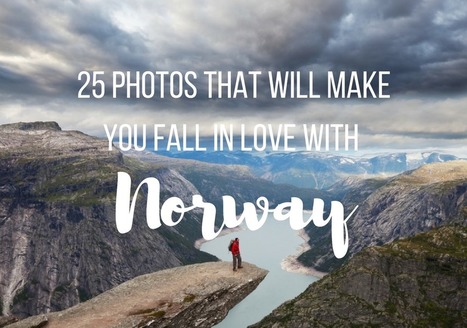"So how gorgeous is Norway? From its majestic wildlife, captivating Northern Lights shows, and snowy mountains, to its vivid landscapes, and mystifying fjords, Norway is a must-visit destination for anyone who loves the outdoors. Plus, opportunities for hiking, kayaking, glacier climbing, fishing, and skiing are endless! If Noway wasn’t already on your travel bucket list, I bet it is now!"
Get Started for FREE
Sign up with Facebook Sign up with X
I don't have a Facebook or a X account
 Your new post is loading... Your new post is loading...
 Your new post is loading... Your new post is loading...

Greg Hill's curator insight,
September 28, 2015 12:06 PM
I love to travel for it challenges what I already know or "think" I know.

Rebecca Cofield's curator insight,
August 5, 2015 6:10 PM
This 11 minute video from the archives is a great profile of a community in flux. Orange County, Florida was transitioning from an agricultural region off the grid to a largest tourist destination in the United States. Obviously, the community's economic geography completely transformed, but the cultural shift to the region was equally drastic. Since Disney today is such a well-known brand and so many students have been to Disney World, they will enjoy seeing what the community was like before it became an entertainment mecca.
Tags: place, tourism, economic, historical.
Norka McAlister's curator insight,
April 25, 2015 5:16 PM
There are a variety of places to choose from when it comes to vacationing, but one of these places may be in your next trip in 2015. All countries have their own attractions. You will find from old cities to modern suburbs to sky-scraping metropolitan cities establishing their place global tourism market. But one thing that shocks me is how the country of Cuba has been open to the tourism business, where for so many years their communist system has been failing and now they seem to be attracted to the tourism business. In many of these countries, building development has stopped for long time but in other places, modern infrastructure brings more tourists to the city. Urbanism plays a big role in how to distribute the cities. Furthermore, cultures, cities, variety of natural landscape, natural beaches, and tradition are some of few points that attract tourism business in the area. However, in some of these places religion, political, and security needs to be addressed and policies must be implemented in order to market these areas as tourist zones. Islamic countries, communist countries, old and modern cities, and even poor countries are all becoming good places to visit in 2015. 
Annabelle Damasco's curator insight,
August 7, 2015 6:48 AM
Most geographers have more than a little bit of wanderlust. Maybe we don't all have the pocketbook for it, but so many people have the desire to explore, travel and see parts of the world that feel as if they are mythical. For students that have the curiosity, it our mission as educators to cultivate that and help them frame the world into a geographic perspective. I've always felt that window-seat flyers are have the seed of a geographer embedded within them...let's make sure those seeds can grow. Tags: place, tourism.
Benjamin Jackson's curator insight,
December 13, 2015 5:50 PM
it is horrifying that a government could force people to live in abject poverty and that the only source of income in this area is a tourist trap that needs to be rebuilt every few years in its entirety. 
Alex Vielman's curator insight,
December 14, 2015 12:18 AM
This video shows a great reflection towards how important culture is to the people living in this African region. The people of the region live in buildings that are made out of mud bricks. From the houses, to stores, to the monuments located here, are practically all made of mud. The most interesting part of this that these buildings can not be modernized at all. This is very dangerous considering that the Great Mosque has to be recovered quite often due to the rain. It is important to analyzing how dangerous these living conditions can be and how the money that is being made in this touristic area, is not being used to efficiently provide buildings made of mud, but rather to simple repair the mosques. The importance of the tourism is what helps the people in the town financial but it affects everyone living in this area because it is surrounded by poverty, and should be provided to guide the people in better safe building.
Adam Deneault's curator insight,
December 14, 2015 6:22 PM
This major tourist attraction site is very interesting, a mosque made of just mud. Everything is mud besides the mosque, business and individual homes. So unfortunately for the citizens, this is not a great place to live. Since this place is historic, outside sources such as the UN do not really want to help the people out because they want the city of Djenne to be preserved as a historic site and they want everything to be as if it was ages ago, they will not even allow interior redesign. It seems though as if the only money they will ever receive is pretty much tourist money, They do want to modernize, but in a way that keeps the history visible. they have failed to modernize in other sectors, such as garbage disposal. their garage is destroying their water which is running through their streets and making the water quality bad, which in turn, makes the mud quality bad for building. |
Matthew Richmond's curator insight,
December 2, 2015 12:06 PM
I completely agree with this article. It is based on the same premise that my spanish teacher always told us. "The only way to truly learn the language and the culture is to actually go there and stay for a period of time." I always assumed she was right based on how easy the class seemed to be for those who had been to Spain or Mexico. The only problem with this theory is the increasingly dangerous state of the world. If I had a child I'm not sure I would allow them to travel anywhere after the Paris attacks. After all, Paris was supposed to be one of the safest places American tourists could visit up until about a month ago. 
Tony Hall's curator insight,
December 3, 2015 11:59 PM
This is a great article. I think it applies to people who live in all developed countries (not just the USA), as well as the privileged people from the less developed places. It touches on a lot of things I care about - seeing, feeling, smelling how other people live. Learning that we are not all the same. Knowing that it is ok to not engage with the "American/Australian/Western Dream". Knowing that it is ok to have your own dreams that are different to other people. 
Sarah Cannon's curator insight,
December 16, 2015 7:15 PM
Being able to travel is a great gift. There is nothing more rewarding than seeing new places and learning about cultures. Unfortunately, the last time that I could afford to travel far from home was when I was young and I didn't understand the amazing opportunity that I had at the time. I traveled to Aruba, and to New Brunswick, Canada. Both amazing places. If I could go anywhere, I'd go to Germany, London, and Ireland as soon as possible. My great grandmother was from England, and my great grandfather was from Canada, I'd like to visit their home towns. Traveling places would definitely be a better learning experience than leaning about a place in school. You get to experience the real thing. Interact with the locals and maybe even get involved with the local traditions. Traveling to learn is definitely an experience worth wild.

Marc Meynardi's curator insight,
June 2, 2015 1:53 AM
This tradition is particularly appreciated by Chinese tourist. Annecy got a bride called "lLe Pont des Amours" where love locks are regularly removed. 
Leslie G Perry's curator insight,
June 2, 2015 8:32 AM
I LOVE Seth Dixon's insight on this and how it figures in with Design Technology. What mark do we leave and why? What are the unintended consequences of leaving out mark? Seth Dixon's insight: Graffiti, tombstones, love locks, monuments...each of these are manifestations of people's desire to have some tangible impact on the landscape. Something that manifests a connection to place in a profoundly personal way.
Questions to Ponder: Why do people want leave a mark on places that are meaningful to them? When do you think that they that these markers are appropriate or inappropriate? Do we have more of a 'right' to mark some places than others? Why do many oppose these personal marks on the landscape? |






















My wife lived in Norway for 18 months, and her love for this country is infectious. The stunning physical geography leads to some equally magnificent cultural landscapes that were forged in a very rugged, inhospitable environment for early human settlers.
Tags: Norway, place, tourism, physical, Arctic, geo-inspiration, images, art, landscape.